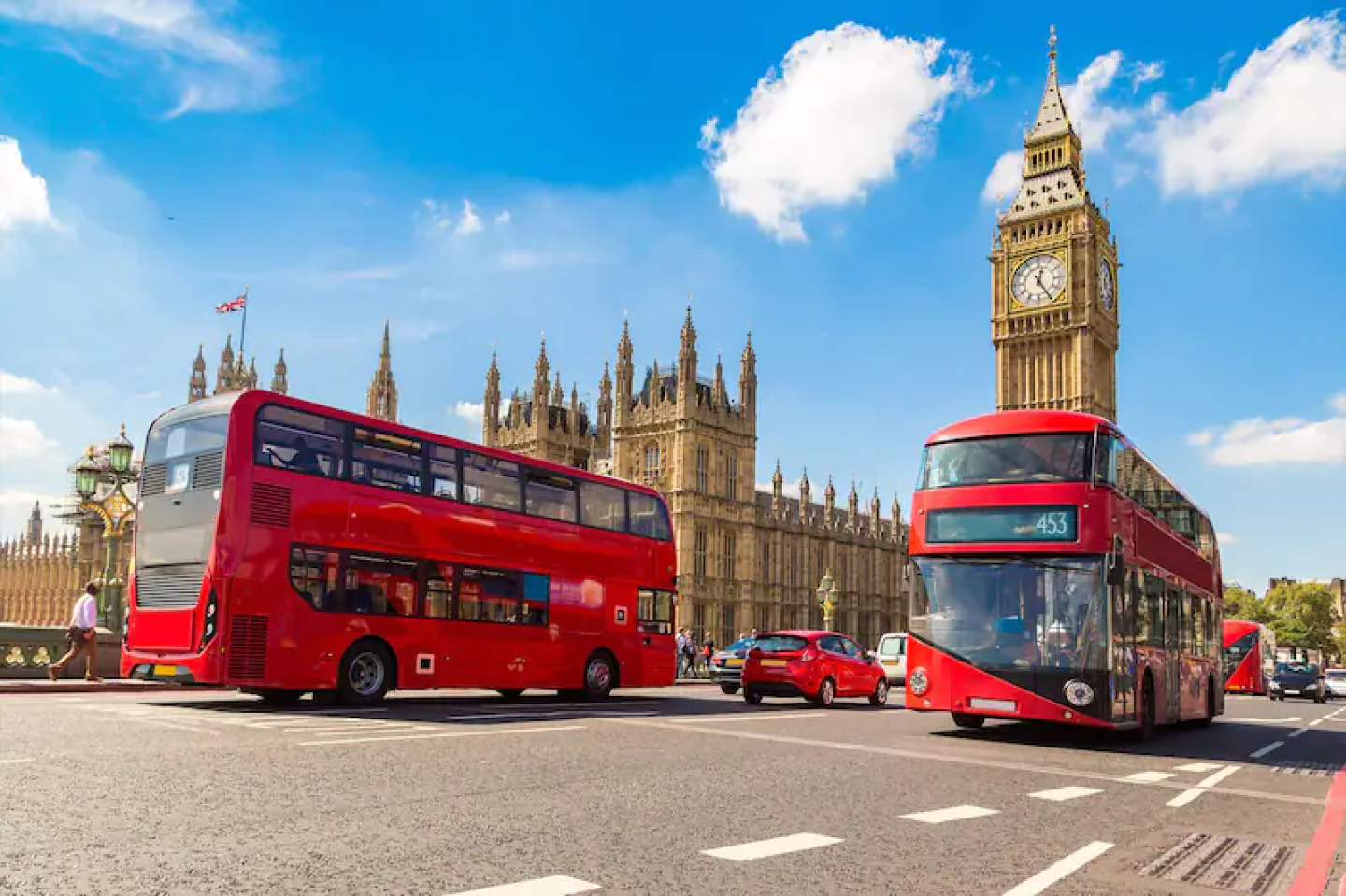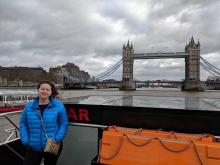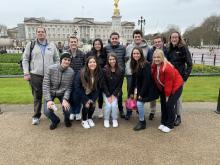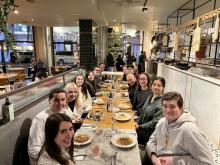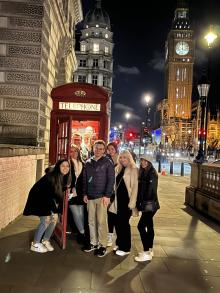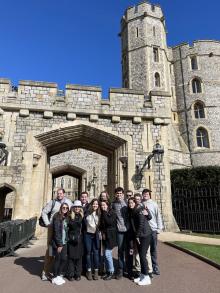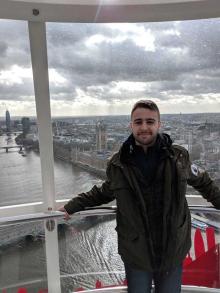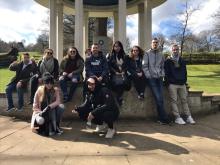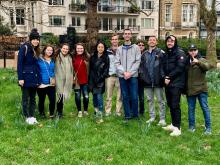This is a Spring semester course with an embedded travel component during Spring break.
Students in LA145 study the developments in early English history that form the basis of the American common law system. As part of their study, students travel to London during spring break to enrich their understanding of this English foundation by visiting places and people relevant to course materials.
These materials in the form of readings, case studies, and discussion focus on the period from 1066-1215. Specifically, topics include the historical origins of the common law system under Henry II and the establishment of limits on royal authority under Magna Carta. These topics are developed in relation to the king’s interest in protecting real property rights and protecting individuals from criminal activity, both of which came to be the basis of common law jurisdiction in the royal courts.
The goal is to provide students with the historical underpinnings of the American common law system.
LONDON TRAVEL OVERVIEW
8
Days of Travel
Including roundtrip nonstop air travel, hotel stay, and a range of activities
$3323
Trip Cost
Estimated cost, dependent on final airfare
12
Students
Class enrollment is limited to selected students
Travel and Course Details
The seven-day itinerary includes roundtrip nonstop air travel from Boston to London, seven nights in a London hotel close to Kensington Gardens, and a range of activities in London, Canterbury, and Windsor. A large cooked breakfast daily is included in the price of the trip, the cost of an additional meal most days and activities fees. Go to the “Frequently Asked Questions” in his menu for a listing of what is included in the price of the trip and for more information about costs.
After arrival on Saturday morning and hotel check-in, we will spend the afternoon visiting the famous London street fair known as Camden Market. In the evening we will have a dinner and also visit Big Ben, all aglow in the dark.
Sunday is a general site-seeing day. We will likely visit the Cabinet War Rooms and Museum, the Changing of the Guards at Buckingham Palace, the British Library to see an original copy of the Magna Carta, and Speaker’s Corner.
Each day Monday through Thursday will have a theme related to the course. On Friday, which is your free day and evening, you can plan your own itinerary. During Monday through Thursday we will visit among others the following well-known sites:
- Canterbury Cathedral
- Windsor Castle
- Runnymede
- The Tower of London
In addition we will visit the Houses of Parliament to meet with a member of the House of Commons, tour both Houses, and sample a debate in the Commons. This year’s Member of Parliament has not yet been identified, but in the past we have met with several well-known members who later served in the British Cabinet.
We will also sit in on a few criminal trials in the Old Bailey, London’s Central Criminal Court, and have a formal meal in Middle Temple Hall where English and Welch lawyers train to be barristers. The Hall was built in the middle ages and suffered bomb damage during WWII.
Evening activities will include the “Jack-the-Ripper Walk” through East London, a play in London’s famous West End, and a traditional English dinner in a “posh” English restaurant.
Travel around London will be by tube or double-decker bus. We will also include a boat trip down the Thames and a railway journey into the countryside.
A brochure on the London itinerary will be distributed before the day of departure.
To enroll in LA145 English Origins of American Law, you must submit two applications.
- One is electronic and is found on the Cronin Center Study Abroad “short term program” website.
- The other is a one-page hardcopy application, which must be obtained directly from Prof. Salimbene.
Both applications must be submitted by October 15, sooner the better.
Although this course is a spring 2025 course, the application process takes place during September and October 2024. Prerequisites are that a student should have completed GB110 or LA100. Both upperclassmen and underclassmen are invited to apply. Professor Salimbene has sole discretion as to who will be enrolled in the course. See below for more information about the selection process.
To pre-register, you should make an appointment with Professor Salimbene whose office is in Morison 133. During the appointment, you will be given a hardcopy application form to complete and return. This is in addition to the electronic application.
Cost of the trip is $3,323 This includes a $125 administrative fee and airfare. It is an estimate dependent on the final airfare. A $500 deposit is due when you complete the STP application on the Study Abroad website. The deposit is non-refundable. If, however, the trip is cancelled by Prof. Salimbene or by the university, or if your application is not selected, the deposit will be refunded.
If you are not selected for the course, however, you can be placed on a waiting list. A student can be moved from the list into the course anytime up until the date the course is to begin in January.
Class enrollment is limited to 12 students. Students will be selected using several criteria. Among others, the criteria often, but not always, favor:
- seniors over other students
- good academic performance in prior relevant course work
- valid academic and professional objectives for taking the course
- students who have not previously traveled to London
- Law Minors
If you have any questions, please contact Prof. Salimbene directly. If you have any interest in the course, do so at the earliest opportunity.
He may be reached:
- in person in Morison 133 (Tuesdays/Fridays)
- by e-mail at fsalimbene@bentley.edu

London is one of the world’s great cities. Its founding goes back to Roman times when it was known as “Londonium.” It was primarily, however, as the imperial city of the great British Empire that London grew to the height of its importance and influence in the world. From the Eighteenth to the first half of the Twentieth Century, London was in many senses the capital of world politics, diplomacy, and finance.
Today, London retains many of its imperial characteristics even though Britain is now a much less influential country. Palaces, cathedrals, and monuments to the past are everywhere. As one student who traveled to London recently commented, "You’re just overwhelmed by history." London is history, but it is also a vibrant, exciting place that beckons the adventurer and the traveler as well as the poet and the musician.
Most importantly for you, London beckons, educates, and entertains Bentley students every spring break. In fact, since 1992, when the first group of Bentley students taking this course traveled to London during spring break, more than 350 have since visited this great city. There is plenty of time for sight-seeing and partaking in the particularly English way of life, whether it’s sailing on the Thames, a street market in Camden town, or high tea at 4:00 p.m. We even manage a guided walk through the alleys and side-streets once stalked by Jack the Ripper.
Combined with these less academic activities are visits to Parliament and the Law Courts. For instance, in the years since 1992, we have met with many different members of Parliament. For instance, we’ve met with Dennis Skinner, MP, a dyed-in-the-wool socialist who represents a coal mining district in Derbyshire. Before being elected to Parliament, Mr. Skinner worked as a miner. As a socialist, he had a lot to tell us about the “evils of capitalism.” Also, we met with Ann Taylor, a member of Tony Blair's Cabinet in the early 2000s. Since Blair’s premiership, we have continued to meet with Members of Parliament, always an enjoyable encounter. Recently, we’ve been meeting with Tonia Antoniazzi, MP, Chair of the Northern Ireland Affairs Committee.
There is just too much to talk about in this short introduction, so to expand beyond this introduction to London, cut and paste or click on an item below and explore on your own.
Below is the sequence of meetings and assigned materials and submissions. In addition to the academic components of these meetings, meetings will include explanations and expectations related to the practical aspects of our travel together. Together these will constitute pre-departure orientation.
Note: The syllabus is subject to change during the semester if, e.g., weather affects the university schedule or assigned materials and resources become unavailable.
Session 1- An Introduction to Early Common Law
| Topic | General Historical Context in England (1066-1216) |
| Assignment |
|
| Current Issue | The UK in the popular news |
| Video | The State Opening of Parliament |
| Web Links |
Session 2 – The Social Hierarchy of Medieval England
| Topic | Medieval English Society (1066-1216) |
| Assignment |
|
| Group Presentations: | Royalty, the Church, and the people of medieval England |
| Current Issue | The Political Parties and the Results of the 2024 UK National Election |
| Video | Prime Minister’s Question Time |
| Web Links |
Session 3 - Protecting Interests in Land
| Topic | English Common Law Possessory Writs (1066-1216) |
| Assignment | Read Hudson 118-156; 186-219 |
| Group presentations | Writs of Novel Disseisin, Mort D’Ancestor, and Utrum |
| Special | Mid-term Exam Assigned |
| Current Issue | Scottish Independence |
| Video | Prime Minister’s Question Time |
| Web Links | Scottish National Party (SNP) |
Session 4 – The Conflict between the Royal and the Ecclesiastical Courts
| Topic | Ecclesiastical Court Jurisdiction |
| Assignment | Read The Constitutions of Clarendon (1164) |
| Special |
|
| Current Issue | Scottish Independence |
| Web Links |
Session 5 – Early Common Law and Crime
| Topic | Crime, Law, and the Development of the Jury (1066-1216) |
| Assignment |
|
| Group Presentation | Contemporary Political Party Profiles |
| Special |
|
| Current Issue | Northern Ireland and Brexit |
| Video | Prime Minister’s Question Time |
| Web Links |
Session 6 – Magna Carta
| Topic | Magna Carta: Context and Significance (1215) |
| Assignment | Read: Hudson 220-239; Magna Carta; Thomas v. Alan Harvester (1202) |
| Special |
|
| Current Issue | Topics for meeting with Member of Parliament |
| Video | Prime Minister’s Question Time |
| Web Links |
Session 7 – The Common Law in the United States
| Topic | The Legacy of the Common Law: William Blackstone |
| Assignment | William Blackstone: Your Perspective |
| Special | Research Topics (individual 5-minute presentations) |
| Video | Prime Minister’s Question Time |
| Web Links |
London and Environs Itinerary
While Sunday is an orientation day and Friday is a free day, the other four days each have a theme related specifically to the course material.
Canterbury
| Focus | The Cathedral: The conflict between the Royal and Ecclesiastical Courts took on a very personal tone in dealings between King Henry II and Thomas Becket, the Archbishop of Canterbury. Their relationship soured to the point where soldiers pledged to Henry attacked and killed the Archbishop in Canterbury Cathedral. Our visit to the Cathedral includes a guided tour of this 12th Century edifice, a visit to the site of Becket’s murder, and an invitation to the service of Evensong. |
| Web Link | Canterbury Cathedral |
Runnymede and Windsor Castle
| Focus | Magna Carta: As the document integral to the common law and the concept of limited government, Magna Carta must be understood in its historical context. To assist in understanding this context, we visit Runnymede, the place of its signing by King John in 1215. Students read aloud portions of the great document in the mede while we recount the story of John’s journey from Windsor Castle under forced guard. Later in the day we tour the Castle itself. While in London, we visit the British Library to view one of the four remaining original copies of Magna Carta. |
| Web Link | Runnymede |
Houses of Parliament
| Focus | Meeting with Member of Parliament: While Parliament did not exist during the period leading up to Magna Carta, it has come to symbolize representative democracy in the world today. To enhance our understanding of British politics and the contemporary issues facing the United Kingdom, we take a tour of both the Commons and the Lords, and we sit in on a debate in the House of Commons. The highlight of our visit to Parliament, however, is a 45-minute question and answer session with a member of the House of Commons. |
| Web Link | The BBC |
The Crown Court (The Old Bailey)
| Focus | The English Courts: This day is set aside for two important visits. We sit in on a trial at London’s famous Central Criminal Court (The Old Bailey). Following the trial, we assess the experience and discuss similarities with American criminal trials. Second, we visit Middle Temple, one of the Inns of Court where English and Welch students train as barristers. Here we are met by the Director of Education at the Inn and mix in for a meal with judges, barristers, and students in Middle Temple Hall. It is the same Hall where several signers of the American Declaration of Independence and the U.S. Constitution ate while studying for the English bar in the 18th Century. |
| Web Link |
Timeline for Course and Travel
Class is tentatively scheduled for Tuesdays, 6:30-9:10pm.
| Jan 15 | Assignment for 1st class on Blackboard |
| Jan 23 | 1st class meeting |
| Jan 30 | 2nd class meeting |
| Jan 30 |
|
| Feb 13 |
|
| Feb 27 |
|
| Mar 06 |
|
| Mar 08 | London departure (evening flight) |
| Mar 16 | Boston return (evening arrival) |
| Mar 26 |
|
| Apr 24 | Research paper due |
1) What is the cost of the trip and what is included?
For spring 2025, the cost is $3,323. This will only change if the airline changes the price of our reserved seats. Any change will likely be small. Below is the list of items included in the price of the trip:
- 7 nights hotel
- 7 cooked breakfasts
- 7 additional dinners or lunches
- roundtrip non-stop air fare
- transfer Heathrow airport to and from hotel on arrival and departure
- London bus and tube pass
- rail journey to Canterbury
- rail journey to Windsor
- Thames boat ride to The Tower of London
- London Eye
- theatre ticket
- Windsor Castle
- Tower of London
- Cabinet War Rooms and Churchill Museum
- Canterbury Cathedral
- Middle Temple
- Jack the Ripper Walk
2) How much spending money should I bring to London?
Because of the inclusion of all scheduled activities in the price, the amount of your out-of-pocket costs will depend on you. On average, you may need about $35-$40 a day. This is a very rough estimate. How much one spends is a highly personal thing. Some students simply spend more than others. Having said all of this, it always is a good idea to have a credit card with you too.
3) Should I bring cash, travelers’ cheques, or my ATM card?
Students have had success using their ATM cards in London. Remember, however, that if you use your ATM, both the dispensing bank and your home bank may charge fees. You also may not be able to access your savings accounts from England, but only your checking account so have enough money in it. In addition to ATMs, before leaving Boston you can purchase travelers’ cheques either in dollars and convert them into pounds sterling when we arrive in England, or you can purchase them in pounds sterling before you leave Boston and not need to convert later.
4) Do I need a passport?
Yes. If you don’t have one already, it’ll take about four to six weeks to obtain one. You can begin the process by having a passport photo taken at a CVS.. Then take the photo plus any official identification to the Waltham Post Office on Main Street. The post office will charge a fee of $130 for your passport. You should check with the Study Abroad Office for more information and assistance.
5) Do I need a visa?
Not if you travel on a U.S. passport, but you may very well need one if you are traveling on a passport issued by another government. To obtain a visa requires that you contact the British Consulate in New York City. For information and procedures go to the consulate web site at https://www.gov.uk/browse/visas-immigration/ . The Study Abroad Office can help with this.
6) What should we expect for weather in England?
Average temperatures in London in mid-March range from the high 40s daytime to the high 30s nighttime, but during the last few trips, we have seen wide variations from snow one year to mid-60s and sun the next. Nonetheless, you should always be prepared for rain, so pack a collapsible umbrella.
7) How should we dress?
For most days clean, casual clothing is in order, jeans or slacks, sweaters, jackets, and comfortable waterproof shoes or sneakers. Some events, however, will require dark jacket and trousers plus a tie for male students, and a dark pant or dress suit for females in addition to dress shoes for all. Also, more generally, do not wear clothing or hats that identify you as an American, e.g., baseball caps, sweats or jerseys with typically American references; they are not allowed on the trip, e.g., leave Bentley garb at home.
8) How long is the nonstop flight?
About six hours eastbound and about seven hours return.
9) What time will we get back to Boston on Saturday, March 16?
Early evening.
10) What is the rule about drinking?
The UK allows drinking at 18 years of age. This does not mean, however, that immoderate drinking will be tolerated on the trip. Students who abuse the privilege will be sent home—clear and simple. And because trip tickets are not interchangeable, any student sent home early will be required to purchase a new ticket at their own expense.
11) What about meals?
The hotel will provide a large breakfast with your choice of hot and cold items. You can eat as much as you want. The trip will also provide one other meal each day, usually dinner. Because of the daily schedule, however, dinner will often be scheduled late in the evening.
12) Can we go out at night on our own?
The short answer is "no" (except on your free day). Days and evenings are tightly packed with scheduled events. You should expect to be with the group for all events. The group usually returns to the hotel twice each day—late afternoon for about 90 minutes and then again about 11:00 p.m. Upon returning to the hotel at the end of the day, students who wish, can socialize in the hotel lounge.
13) Will we have any free time while we're in London?
Yes, the last full day and evening of the trip is scheduled as free time. This is the only free time on the trip. You will, however, also have the opportunity to explore Canterbury and Windsor in small groups of two or three when we travel to these destinations during the week. There is also usually some down time back at the hotel late afternoon each day.
14) How are students selected for the course?
Because there is a limit of 12 students, it may be that not all applicants will be accepted into the course. The selection process considers the student’s class level, GPA, letter of intent, prior travel experience, recommendations, and other factors. For instance, freshmen are encouraged to apply, but a senior will often be selected over a freshman; someone who has never traveled to London will be selected over someone who has traveled there; a law minor might be selected over someone who is not minoring in law. There are no set criteria, however. You should not hesitate to apply.


